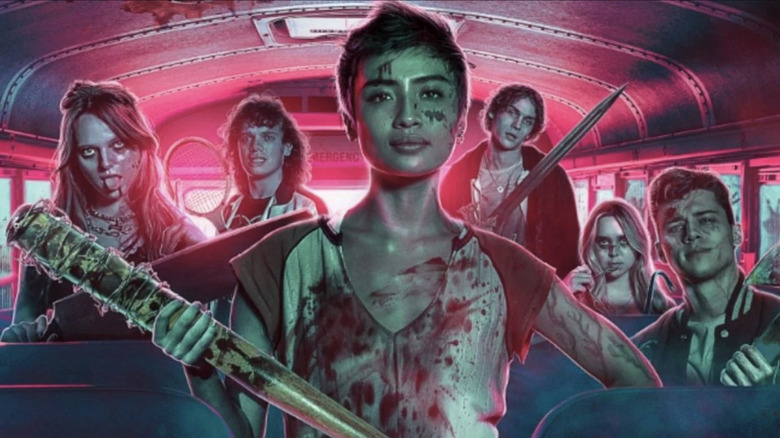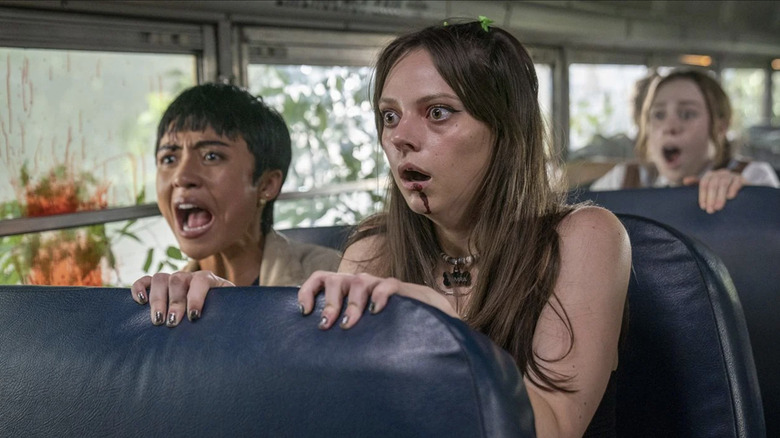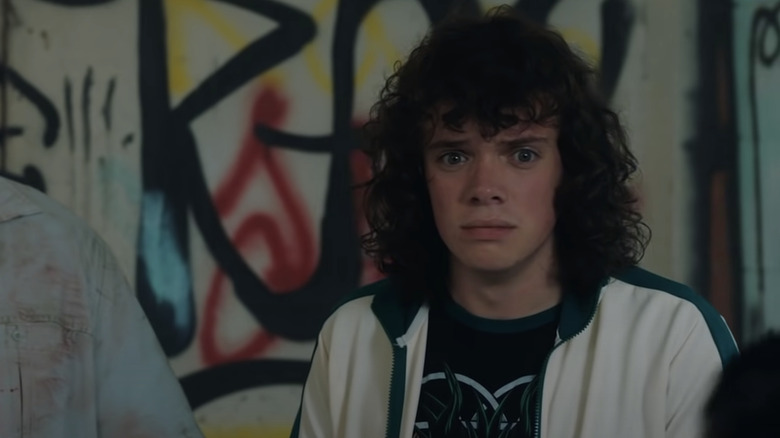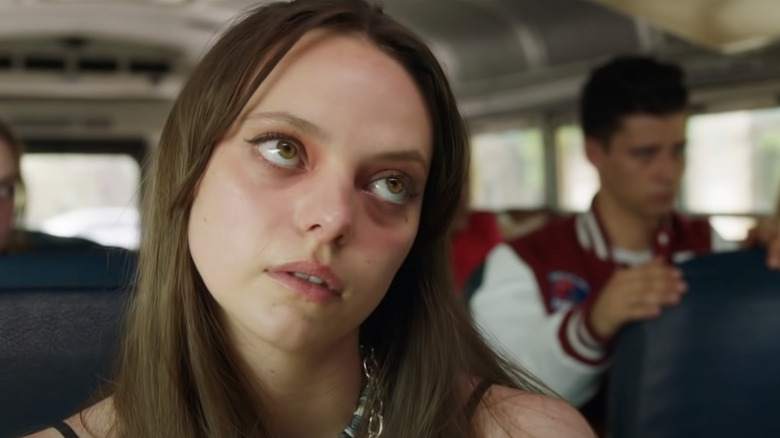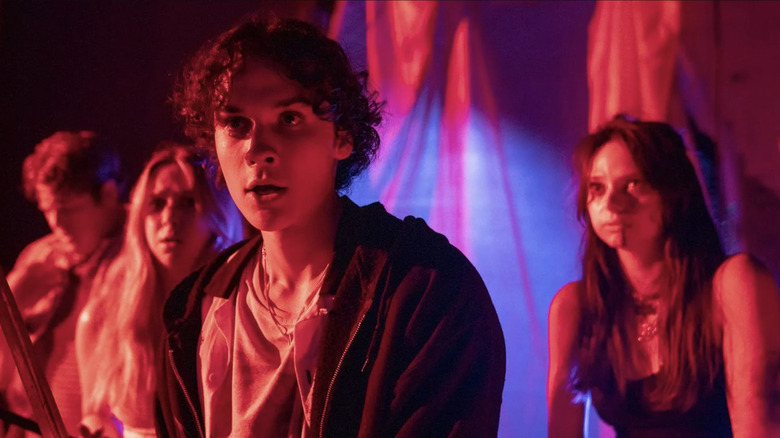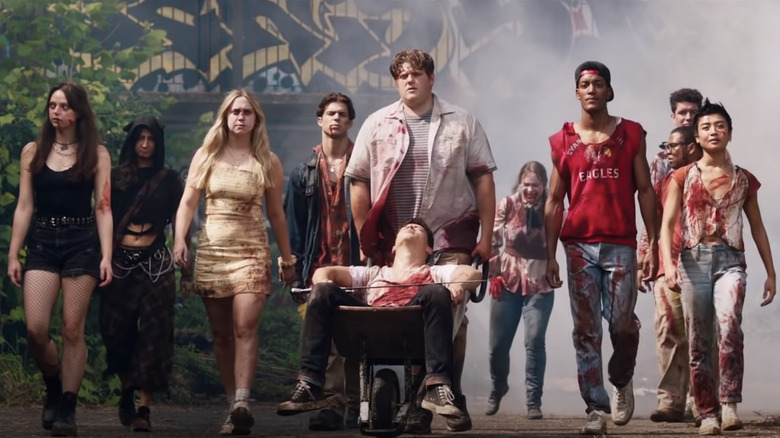Unhuman Director Marcus Dunstan Combines Horror With A Gen Z After School Special [Interview]
Marcus Dunstan has been in the horror business for quite some time. Dunstan and his frequent collaborator Patrick Melton burst onto the scene as the winners of the third season of "Project Greenlight," which helped them make a monster movie called "Feast." Suddenly, the duo were the hottest new horror ticket in town, and it led to their writing of the latter "Saw" films, starting with "Saw IV." The duo have continued creating horror goodness, turning "Feast" into a trilogy, creating the popular film series "The Collector," the reboot comedy sequel "Piranha 3DD," the Thanksgiving flick "Pilgrim" from Hulu and Blumhouse's "Into the Dark" series, and now the "Blumhouse After School Special" teen horror comedy "Unhuman," which debuts this week.
Admittedly, I have an odd history with Dunstan. When I first started writing about film, I was a teenage student at Western Illinois University in Macomb, Illinois, which happens to be Dunstan's hometown. Without sounding like an elitist prick, Macomb is located in the middle of nowhere. The fact Dunstan managed to get out of Macomb and become a successful horror filmmaker seemed impossible to my teenage mind, so of course, I viewed Dunstan as an inspirational success story. That's why, when I opened my Zoom window to interview Dunstan for "Unhuman," he was holding a copy of The Western Courier, my university's newspaper where I frequently shoehorned in articles about horror. Nearly a decade later, Dunstan has made a killer movie about teenagers and I'm writing about it in a professional capacity. It felt like we had come full-circle in a moment of horror celebration, which is precisely how "Unhuman" should make viewers feel when the credits roll.
This interview has been lightly edited for brevity and clarity.
'We're a little tougher than the problems before us'
A lot of your work is very much aimed at an adult audience, so what made you want to explore the special brand of hell that is teenage horror?
Well, it's almost as if a reservoir was filled that just hadn't been tapped. When we worked on the "Scary Stories to Tell in the Dark," it was inching towards that. I mean, we could have filled several movies with the trauma that is high school and thought, "Well, okay, if these formative years of these combustible adolescents were to be mixed with the rules of a horror movie, would the stereotypes presented often be able to hold their form?" And the exciting part was saying, "No, they probably wouldn't." It's kind of like the life that waits on the other side of high school is like — you're teed up for the highs of love, the lows of defeat, and everything in between, and then life comes along like, "Guess what? It gets louder." So I thought, "Okay, well let's do that and go back to the memories, our most vulnerable points, find the wicked humor and how sometimes we figure out a way to deal with those traumas, and sometimes we turn it on its head and find out that we're a little tougher than the problems before us. And as long as we've got the right friends and the right heart inside, we can now bleed anything trying to attack us and go for it."
Honoring stereotypes instead of exploiting them
Teen movies often serve as cultural time capsules because they're usually trying to strike what is cool right then and right now, which is also why so many of them age like milk in the sun. What was the process like for writing characters of a different generation and of an entirely different world compared to when you were a teenager?
Well, I wanted to take some of the iconography from the seminal movies growing up that were sort of our teachers, because I loved that we had permission to say "A Blumhouse After School Special" at the front.
Oh yeah, that was great.
After school specials did not possess a ton of subtlety in what they were going for. So between that and a reference to the "Scared Straight" program, and all these ways that when we were growing up, adults were going to tell us something through fear that's going to change us. What happens if fear actually marches in and says, "No, no, no, here's how you get it done?" It was a conversation between the stimuli of that era, like taking the jacket from the background of "The Blob" remake or "Ferris Bueller," and coming up with this constant collage of things that would always register and honor the best of the stereotypes. Like, yes, please think "athlete," please think "bully," please think "vulnerable," please think "the person still in formation wondering what their role is." Please, please, please do that. And then [we] open the door so we can tell a human story about an unhuman threat. And then really start to get into our theme of how bullying isn't always just the one person asking for it. No. We've all got the capability to be a bully over something. And it's like, "What if that lesson was going to hang around in your face and teach you until you got it?"
'The sugar that delivers the theme'
The movie is also so fun, despite dealing with these very intense situations. What made you want to throw these themes through the lens of a horror comedy and not just an all-out hard blood bath of terror, because there's a lot of levity here!
Oh, bless you. Thank you. That was because we wanted to come up with a method — what is the sugar that delivers the theme? The person that would make me laugh in a horror movie or a situation, I identified with them. And so any violence had a rise in decibel for what I thought. And I felt like, "Well, that might be the way in." Plus, it was so much harder to do that, to add some levity and keep a pulse rate going. I think that was just straight up a masochism event for myself. I just went, "Yeah, let's do it," because those movies are the ones that hang with me the longest. Especially in the realm of, when you start to get into certain things, like it says, "zombie," you can think of a lot of things. Of those, how many kind of go for this specific deal? It's not necessarily "Zombieland" in terms of yes, that's horror and humor, but no, something a little closer to the skin. It's something a little angrier, if you will — but people reacting with humble hearts.
'Let them all have layers'
I think you're right, it is that feeling of like, "I have to find humor to get through this," so I think that's a very human thing to explore. And thinking about this humanity, a lot of the teen movies that we can clearly like point to have always painted the nerdy kid as this purely innocent soul that's getting bullied and they don't deserve it, and you're playing with that trope here a little bit. Why did you want to play with this specific trope?
Far too often in movies where you're depicting folks that are kind of getting offed or pulled out of the narrative for one reason or another, the first three people to go are usually the most interesting characters. And you kind of want their reactions, because by the end, it's usually the same type of concoction of a character at the end. They'll suddenly have a witty one-liner, know a special martial art or something. And you're like, "Where were you in Act One?" It was folks with more busted pieces in themselves that ultimately led to their demise. I don't know. I just tended to identify with those folks. I definitely was in the basement in Macomb with two VCRs, putting these tapes together and battling vicious acne. And yeah, horror movies helped me get through. So those characters, they were also allies. They were also fully fleshed-out beings. You may think that this arsenal of knowledge of watching all these horror movies for years may never lead to anything, but sometimes it does. And when you're ready to unload it, there it is. I thought this was that opportunity, where there's a whole buffet of these characters representing different pillars of high school life and let them all have an arc. Let them all have layers. The stereotype wandered in to be in a comedy in this movie, but the horror movie showed up and said, "What's your drama?" And they became characters.
High school is 'harrowing'
But I love that you also brought up you being a teenager and watching horror movies. Had you been the teenager on this field trip from hell, how would teenage Marcus have dealt with this situation?
Oh my gosh. You know what? I have a feeling it'd be somewhere between the person who goes, "What?" and then when the bus collides, instant nose break. I think I would've been passed out the whole time in the bus, you know? Even the threat just steps right over me. Maybe not, I don't know. [laughs]
Something else that this movie explores that is unfortunately, very painfully relevant every day, is that there is such a resilience to teenagers that I don't think people give them credit for. I'm just curious if you can speak on how you were able to channel that into these characters.
I went all in on this one and I had action figures made of them because they're so doggone resilient. You know?
Oh, that's amazing.
And it all started with what happens to Brianne [Tju], who starts out really feeling like this sort of nothing, but then by the end, is this fully forged person. Without getting too much into it, it's based on having to find the protector, find the defender, find the valor in one's self that I think is what high school really is. They're kind of put into this wild universe where it really is terrifying, and you got to go in with a lot of hope. I was fortunate to have wonderful friends, awesome family, all that, and it was still harrowing. It still was. So I hope I'm respecting the question. Yes, these young people today are being asked to handle more than ever. And I think there's something haunting about that phrase, "That's my truth," because what happened to that old phrase, "the truth?"
Absolutely. How are you hoping that the teens that watch this movie walk away feeling?
I want them to feel, "That movie didn't talk down to me, didn't try to speak above me. That movie heard me."
"Unhuman" will be available on digital VOD on June 3, 2022.
